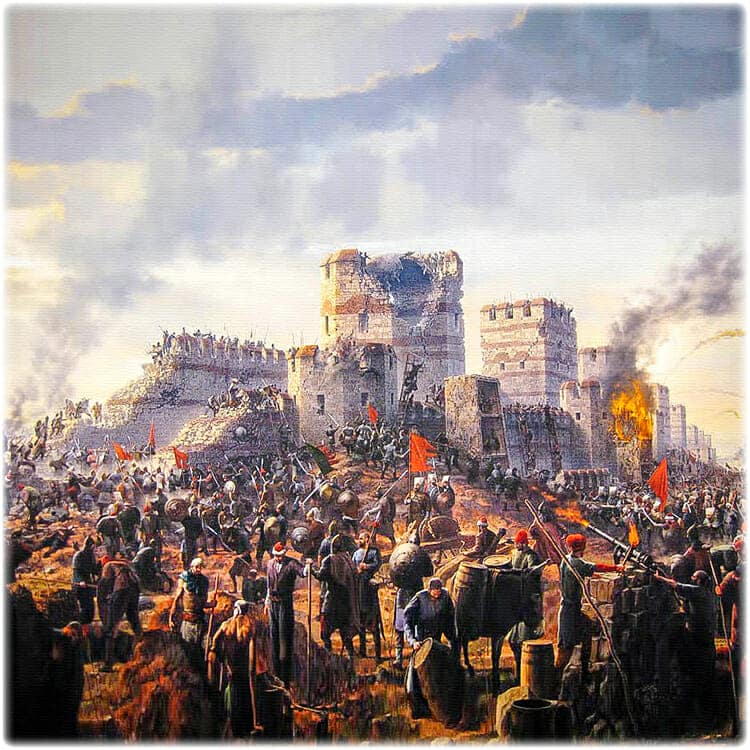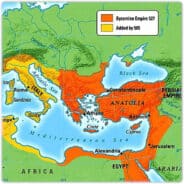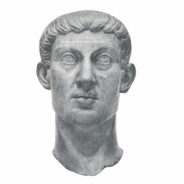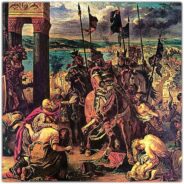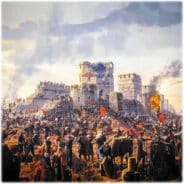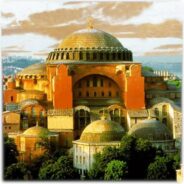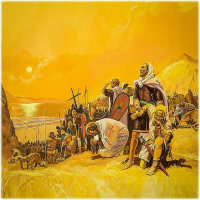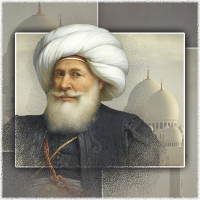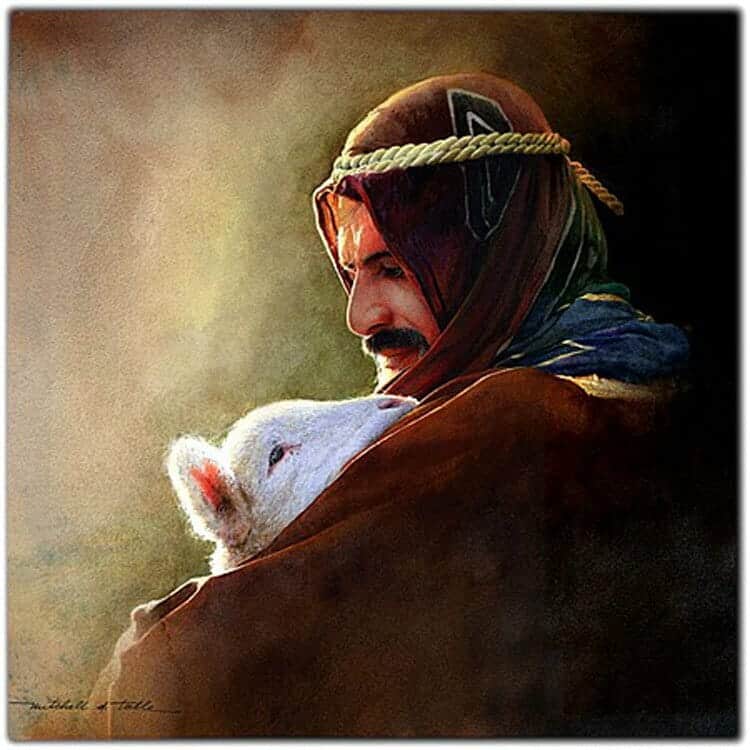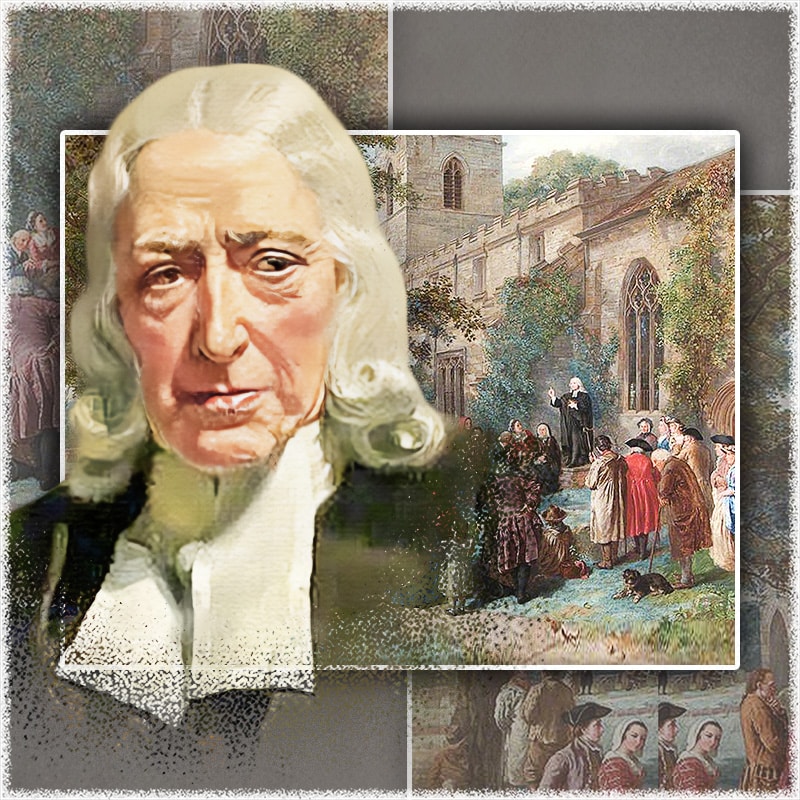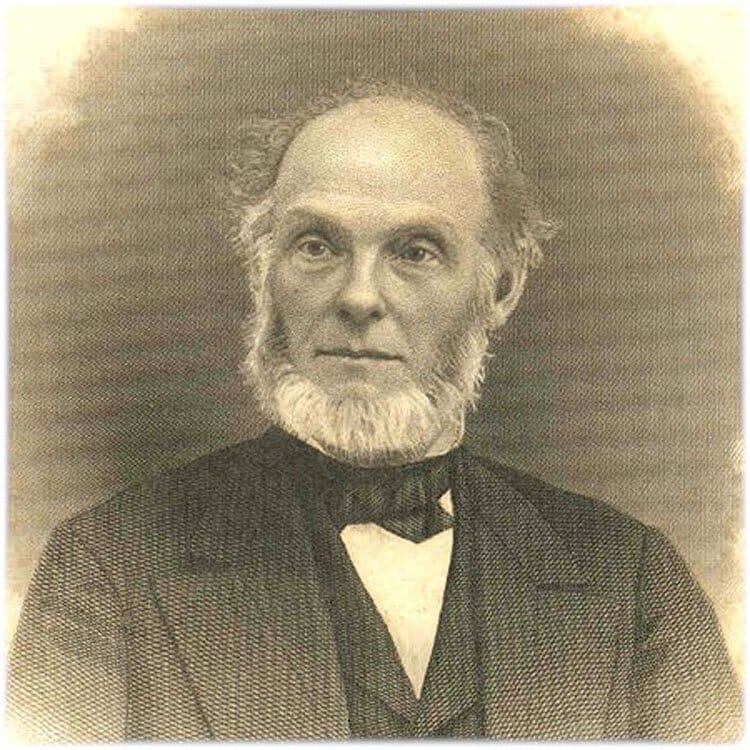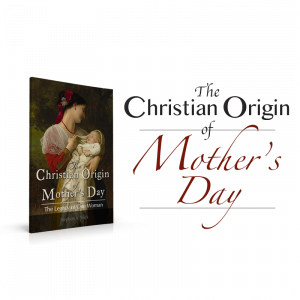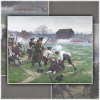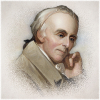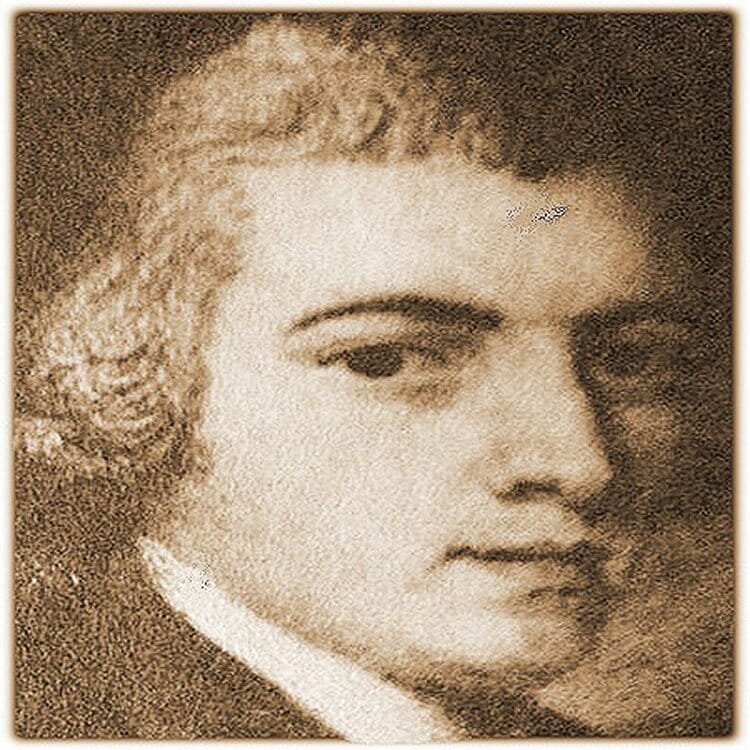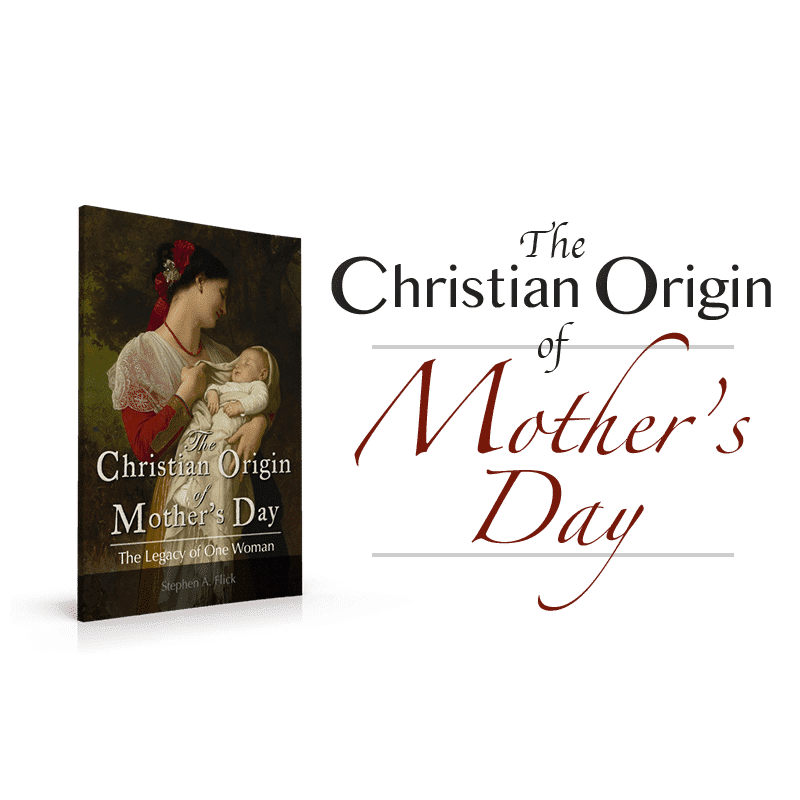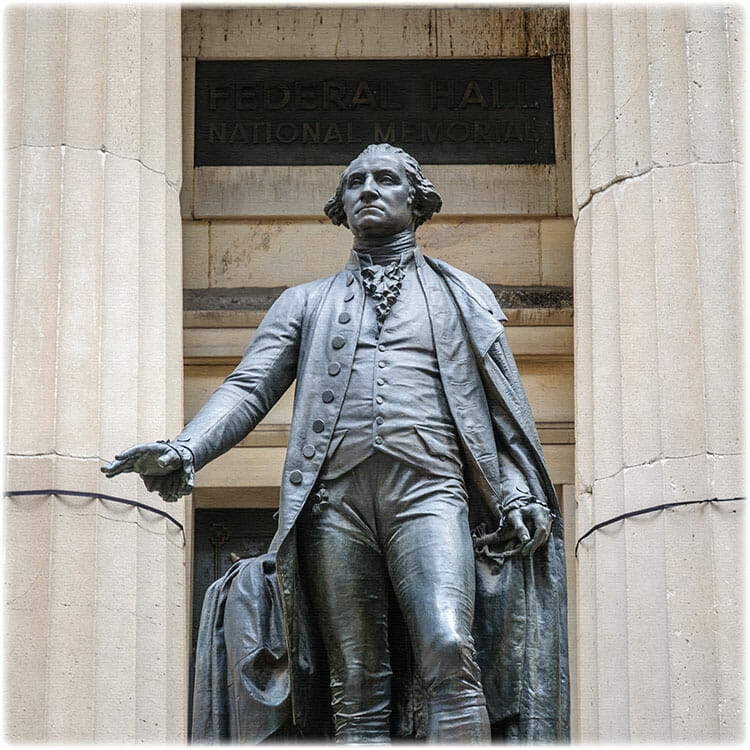The wanton destruction of the Christian capitol of Constantinople by the Muslims is but one of many untold horrors of Islam's long crusade against Christianity. In recent years, many pundits of the media have attempted to hold Christianity up to ridicule because of the Church's Crusades against Islam,[1] but the prejudiced pundit never publicly acknowledges the many crusades of Muslims against Christians and their lands, 458 years before one Christian Crusade was waged against the Muslim aggressors.[2] The destruction of the city of Constantinople, capitol of the Christian Byzantine Empire and successor of the Roman Empire, is the tale of only one of those Muslim crusades against Christ and his Church.
The Origin of Constantinople
The city of Constantinople had its origin under the Greeks, but received its prominence from the Romans. In 658 BC, a Greek by the name of Byzantas led some of his fellow countrymen from the colony of Megara to establish a city on the coast of Keratia bay, south of the present-day Black Sea. The new city received its name, Byzantium, from its founder.
Centuries later, Byzantium was conquered and dominated by the Romans. Constantine the Great became convinced that attempts to govern the Empire from Rome itself would not allow him to wield sufficient control over the eastern frontiers of the Empire. For some time, he set up court in different cities, including Treviri (Trier), Arelate (Arles), Mediolanum (Milan), Ticinum, Sirmium and Serdica (Sofia). Finally, he settled upon the Greek city of Byzantium, and on November 8, 324 set up court there, renaming the city Constantinopolis, or Constantinople (City of Constantine). From here, he allowed the city of Rome and the western portion of the Empire to maintain its prominence, and even the senate created in Constantinople was regarded as a lesser senate.[3]
A few years later, in 330, Byzantium was called the “New Rome” and became the center of the eastern portion of the Roman Empire, later to be known as the Byzantine Empire. For eleven centuries, Constantinople was one of the most important centers of the territory of Anatolia, a fact that earned it the title, “Queen of Cities”. Constantine's sympathy for and conversion to Christianity paved way for the toleration of Christianity from the Roman state, but not until the end of the fourth century did Christianity become the religion of the empire. Unlike the method employed by Islam, Christianity conquered the Roman Empire, not by the sword, but by the truth and love of the Gospel.
Conquered by Fourth Crusade (1204)
One of the most tragic events in the history of the Christian Church occurred when nominal “Christian” soldiers of the Roman Fourth Crusade conquered fellow Christians in Constantinople in 1204. For centuries, the Pontiff of Rome and Patriarch of Constantinople had been at odds for a variety of reasons, but nothing that would justify military action against each other. From the time of Constantine, Constantinople had been impregnable, but three days of plunder by the Western or Roman Crusaders destroyed a large portion of the city and helped weaken it against its future enemies, the Muslim Turks. The consequence of this attack was enormous. Constantinople was never again to realize the splendor and power it had previously known.
Muslims Destroy Christian Constantinople
The first major Christian city to fall to the crusades of Islam was Jerusalem in 638 A.D. More than four and a half centuries would pass before Christians would attempt to defend fellow Christians with the First Crusade. Following the death of Mohammad in 632, Islam quickly expanded throughout the Mediterranean world until at last it conquered the center of Eastern Christianity—the city of Constantinople. For nearly five centuries, the Byzantine Empire withstood the onslaughts of the Moslem Turkish tribes of the area Anatolia, but finally, in 1453, the city fell to the Ottoman Turks.
The fall of the greatest Christian civilization known up until that time occurred on May 29, 1453. Constantinople had thrived for more than a thousand years. The ambitious Moslem Turkish leader, Sultan Mahmud II (Mahmud the Pillager) was responsible for its destruction. After seven weeks of siege, the final battle was waged against the city. On the night of May 28, the night before the battle, the Sultan sent messengers to all parts of the camp to make this proclamation, after a trumpet blast:
By the name of Allah, by the name of Mohammed and the four thousand prophets, by the soul of his father, Sultan Murand, by the heads of his children, and by his scimitar, Mahmud swears that when the town has been taken by storm the troops will have unrestricted right to three days’ rapine. Everything within the walls-furniture, jewels and trinkets, gold and silver, men, women, and children-shall belong to the victorious soldiery, the Sultan himself renouncing any reward beyond the glory of having conquered this last bulwark of the Western Empire. [4]
The savage shouts of joy raised by the Moslem Turks could be heard within the city of Constantinople and in the city’s largest church, Hagia Sophia, where the last mass was being celebrated at that very moment.
The following day, May 29, the 8,000 defenders viciously struggled against the 150,000 invading Moslem Turks. For a time, it seemed that the city would be saved, but then a fateful thing happened. A few Turks at the walls of the city discovered that a small door, a kerkaporta, used by travelers who came to the city on foot during peace-time, was unlocked. Through the small door streamed hordes of Turks, overthrowing the city's defenses. One observer reported the horror of what ensued:
Nothing will ever equal the horror of this harrowing and terrible spectacle. People frightened by the shouting ran out of their houses and were cut down by the sword before they knew what was happening. And some were massacred in their houses where they tried to hide, and some in churches where they sought refuge.
The enraged Turkish soldiers . . . gave no quarter. When they had massacred and there was no longer any resistance, they were intent on pillage and roamed through the town stealing, disrobing, pillaging, killing, raping, taking captive men, women, children, old men, young men, monks, priests, people of all sorts and conditions . . . There were virgins who awoke from troubled sleep to find those brigands standing over them with bloody hands and faces full of abject fury. This medley of all nations, these frantic brutes stormed into their houses, dragged them, tore them, forced them, dishonored them, raped them at the cross-roads and made them submit to the most terrible outrages. It is even said that at the mere sight of them many girls were so stupefied that they almost gave up the ghost.[5]
Desecration of Christian Church—Hagia Sophia
One of the most horrific scenes of the carnage and violation of the Christian faith occurred in the main church of Eastern Christianity, the Hagia Sophia. When the city's defenses collapsed, invaders made their way to the Hagia Sophia, believing that the city's richest treasures would be stockpiled there. Upon reaching the church, the invaders battered down its doors and streamed inside.
Throughout the siege of the city, the liturgy was read and prayers continued to be offered inside the Hagia Sophia where the church served also as a refuge to those unable to assist with the defense of the city. Trapped inside in worship, the congregants and refugees became booty to be divided among their captors. The Hagia Sophia was desecrated by the Muslim invaders and worshipers who were not enslaved were slaughtered in the church—among whom were the elderly and infirmed. Those enslaved were bound with chains while the ministers, in defiance, continued with the service until forced to stop by the invaders.
Sultan Mahmud (or Mehmed) had promised his invaders three days to freely pillage the city taking whatever and whomever they wished, but upon entering the city after the battle, saw how grave and thorough the devastation was and ordered it to cease. When the Sultan and his cohort arrived at and entered the Hagia Sophia, he demanded it be transformed into a mosque. Then, one of the Muslim legal scholars (an Ulama) climbed the pulpit and recited the Muslim Shahada. A couple of days later, Friday June 1, the Sultan returned to the Hagia Sophia to attend the first Muslim prayer in the newest imperial mosque—renamed the Aya Sofya.
Islamic Glory Derived
Scholars occasionally point to the fact that the Moslem world has enjoyed bright moments of cultural glory—the so-called Golden Age of Islam. But the truth is any glory realized in Islam is only derived as demonstrated by the confiscation of the Hagia Sophia for Muslim worship. The Golden Age of Islam was the result of the cultural influences of captured people groups, most of whom were Christians. Contrary to liberal assertions that the glory of Islam has equaled or excelled Christian cultural, many of the alleged "Muslim" scholars of the Golden Age were not Muslims, but conquered citizens of conquered lands. For further discussion, please see Robert Spencer's book, The Politically Incorrect Guide to Islam (And the Crusades), pages 87-97.
Conclusion
Because many Christians are preoccupied with the present, they have no interest in the past. As a result, liberal and irreligious pundits easily deceive and persuade the American populace to not only tolerate, but also swallow the malignant and deadly. Christians in America have heard and witnessed their political leaders mollycoddle Islam while Christian denominational officials have remained completely silent concerning Muslim crusades against Christians. In the last quarter of a century, Muslims have once again taken up their militancy toward Christians and the rest of the non-Muslim world. For the most part, politicians and denominational leaders continue to assume a posture of dereliction of duty toward those whom they have pledged—by oath of office—to defend.
On May 29 of each year, let all Christians and people everywhere remember the destruction of Constantinople and the fact that the character of Islam from its beginning under Mohammad until the present has not and will not change!
America deserves to know its true heritage.
Please contribute today!
Related Articles
[1] Generally speaking, the Christian Crusades against Islam lasted from 1096 to 1264, with some efforts to recover Christian lands lost to Muslims lasting into the fifteenth century.
[2] From the year that the first major Christian city (Jerusalem) fell to the Muslims (in 638) to the beginning of the First Christian Crusade (1096), 458 years had lapsed. Nearly half a millennium passed before Christians decided to mount a defense against Islam and recover their land!
[3] See “Constantine the Great,” http://www.roman-empire.net/decline/constantine-index.html, October 4, 2003.
[4] Rushdoony, Christian Survey of World History, 96.
[5] C. R. N. Routh, They Saw It Happen in Europe 1450-1600 (1965); Quoted in "The Sack of Constantinople, 1453," EyewitnessToHistory.com (http://www.eyewitnesstohistory.com/constantinople.htm, May 17, 2013).

